My Personal Experience with Being Adopted
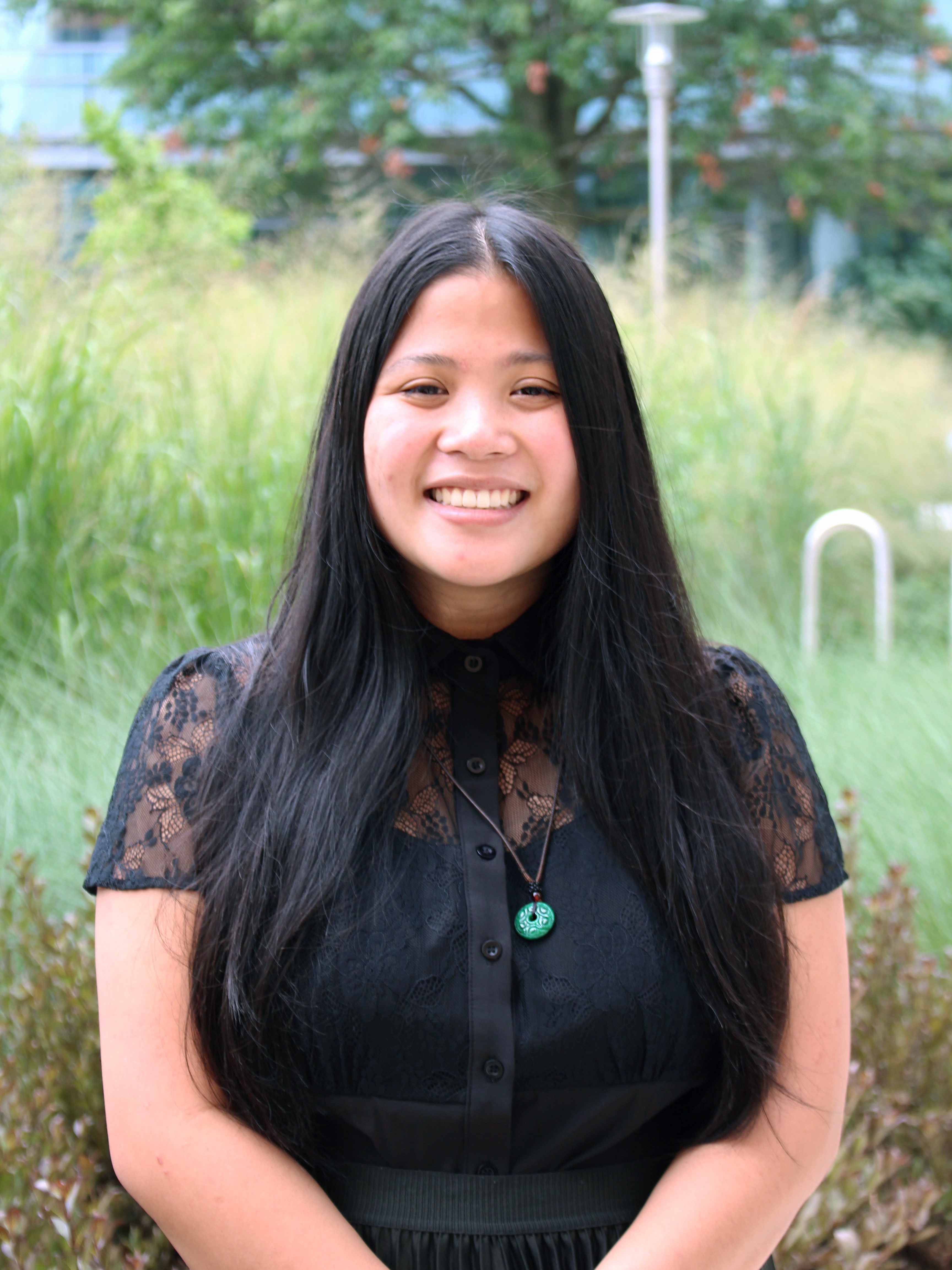 Image description: [Photo shows Rachael dressed in black attire, one of the Women’s Center interns, smiling in front of one of the UMBC buildings.]
Image description: [Photo shows Rachael dressed in black attire, one of the Women’s Center interns, smiling in front of one of the UMBC buildings.]Content Note: This post is written by Rachael Joslow, a second-year and student staff at the Women’s Center. I am a transracial adoptee adopted from Vietnam who grew up in Georgia for most of my childhood and adolescent life. I hope to highlight my experience growing up as an adopted child who dealt with difficulties connecting to my ethnicity and race. I would like you, as the reader, to acknowledge and learn the realities of adoption through my experiences, personal readings, and different transracial adoptees’ perspectives.
Growing up, I was always taught and still firmly believe that being blood-related is not a condition to be a part of someone’s family. As a transracial adoptee of a single, white, tie-dye hippie mom, I have been lucky enough to grow up knowing I was loved unconditionally.
Nonetheless, there are certain inside jokes that only those of us who have grown up in a transracial adoptive relationship know about. For example, when I think about one of the most memorable moments I have had as an adopted child, I remember my mom embarrassing me in public and trying to introduce me to her friends. After saying anything in a loud, funny voice or performing a funny dance in public, she would also try to point towards me and say, “yes, this is Rachael, my daughter!” When these moments happened, I would start walking away from her during the conversation, acting as a random stranger. Once she realized what I was doing, she would then reach out to me and exclaim, “no, really, she is my daughter! Rachael, stop walking away!” This interaction is one of the entertaining aspects of being adopted: if your parent is embarrassing you in public, simply walk away.
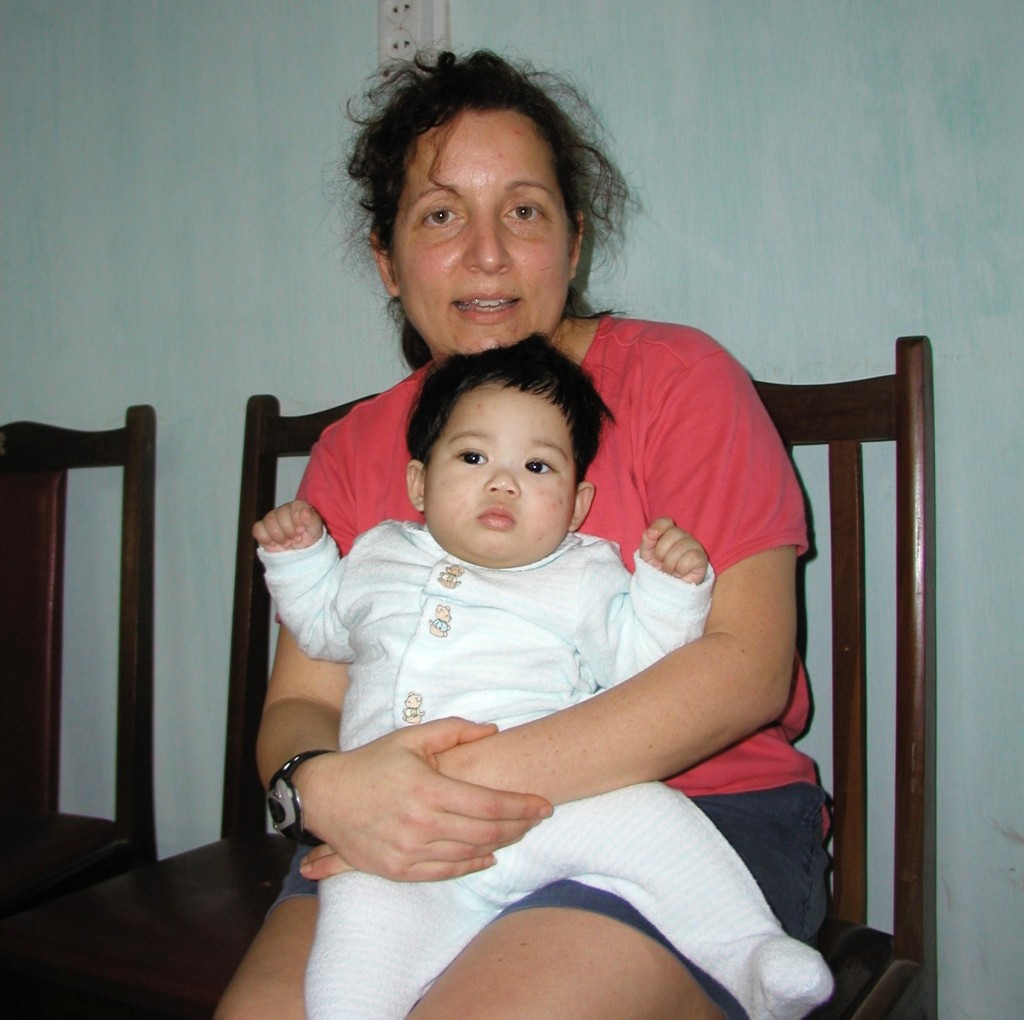 [Image description: An older woman with a brown-haired ponytail sitting in a wooden chair with a baby in her arms. She’s wearing a pink shirt with jean shorts, and the baby is wearing a white onesie.]
[Image description: An older woman with a brown-haired ponytail sitting in a wooden chair with a baby in her arms. She’s wearing a pink shirt with jean shorts, and the baby is wearing a white onesie.]My mom first saw me in an ad in the newspaper one day because she was looking to adopt. She was stationed in Germany at Fort Landstuhl, where she worked as a neurologist at Landstuhl Regional Medical Center. She always wanted to have a family, and in fact, she thought she was going to get married after college and have four children, but as some things turn out . . . plans change! In the picture shown to the left of this text, it was her first time meeting me at my foster home, and I believe I was 7-8 months old in that. I looked pretty cute as a baby! Apparently, I was a mellow infant and I only cried when food was late. As in, I scream cried. I was a moody baby if I did not have food on my plate and it still applies to my age now. Some things never change!
“What was it like being told that you were adopted?”
Well, I was the one who figured it out! My mom tells me that when I was about 5 years old, we were sitting in the bathroom getting ready for bed, and I started saying, “we don’t have the same hair.” My mom would reply with a “yes…” and wait to see what would happen next. I then say, “we don’t have the same eyes,” and she goes, “you’re right.” “I didn’t grow in your belly,” and mom keeps responding truthfully as to not hide anything from me. A delayed response follows from me, and my mom was worried but curious about what else I was about to ask. After the pause, I ask her, “can you pass me the toothpaste?” My mom releases a sigh and passes me the toothbrush.
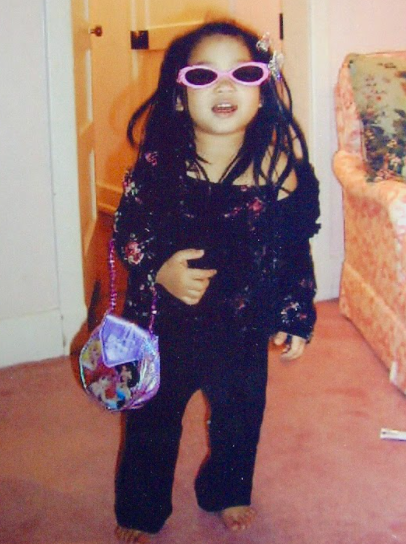 [Image description: An Asian girl with long black hair is shown standing in front of a door with pink sunglasses on and carrying a purse that has Disney Princesses on it. She is wearing black pants and a flower print, blacktop.]
[Image description: An Asian girl with long black hair is shown standing in front of a door with pink sunglasses on and carrying a purse that has Disney Princesses on it. She is wearing black pants and a flower print, blacktop.]As you can see from this interaction, I was unphased that I was not her biological daughter, and I am still unphased by the fact that I am adopted. It still does not change that I have my mom, and she has me, her daughter. She always has and will continue to love me unconditionally, I know—the bare minimum. Still, through her kindness, openness, acceptance, and much more, I realized how she’ll always have my back over time. She was also really transparent with me whenever I asked questions about my adoption. For some background knowledge, there are no names under “biological mother and biological father” on my Vietnamese birth certificate. My mom has always been honest whenever I asked her questions regarding that information. I used to be open to finding my biological parents, but now that I have become older, I am content to not meet them. I settled that I’m sure that my biological parents wanted what was best for me. Through UMBC, I have connected with my Vietnamese culture more by meeting people and joining the Vietnamese Student Association.
“What are other transracial adoptee’s experiences?”
Although my experiences have been smooth and supportive so far, my personal experience is not shared by ALL transracial adoptees. This NPR podcast called Code Switch: Transracial Adoptees On Their Racial Identity And Sense of Self calls in multiple adoptees who talk about their personal feelings and experiences about their adoption. One person stated that they spent the first 12 years of their life thinking that they were white, and learning that they were not white resulted in an identity crisis. Some transracial adoptees are not told that they are adopted, and the consequences can be very harmful. It makes us think as to why the parent was hiding that critical information. Telling children that they are adopted is okay, and it should not be something to hide from them because it erases a part of their identity. Another adoptee mentioned that their adoption acted as a narrative of their mother being a savior. Unfortunately, some people end up adopting because of their savior complex.
What is the savior complex?
As explained by this Psychology Today article The Savior Complex, it is “a psychological construct that makes a person feel the need to save other people. This person has a strong tendency to seek people who desperately need help and to assist them, often sacrificing their own needs for these people.” When a person with a savior complex sets out to adopt a child, they have the goal of rescuing a child from their situation.
As a reminder to people who would like to adopt in the future, it is not about you, and it has never been about you. Adopted children are not your trophies and we should never be used as tools when you want to earn brownie points to “look like a good person.”
Adoption is about giving a home to a child who does not have a family, and it should revolve around giving the child unconditional love and support. It does not revolve around reminding them how grateful they should be that you adopted them. From an article called Avoiding the Savior Complex in Adoption, an adoptive parent explains it well in a letter to their adoptive child:
“You never have to feel grateful for your adoption. We don’t have to have special gratitude for something that is inherently ours. And my love? That’s yours. It was yours before we met. It will be yours when time is gone. It was, and is, your right to have. My love for you is something I want to be so part of your being that it doesn’t cross your mind to even contemplate its existence. Take it for granted. Assume it will always be there. Because it will. There were losses in your lives. I know them. I respect them. My love for you does not take away those losses. But those losses don’t mean you owe us some form of special gratitude. Don’t ever believe someone who tells you they do. I don’t need you to be grateful; I want you to know, to assume, to not even think that there was another option except me loving you. Because there wasn’t. This love? It was here waiting for you all along. You simply claimed what was already yours.“
– Anonymous
“Is it hard being adopted?”
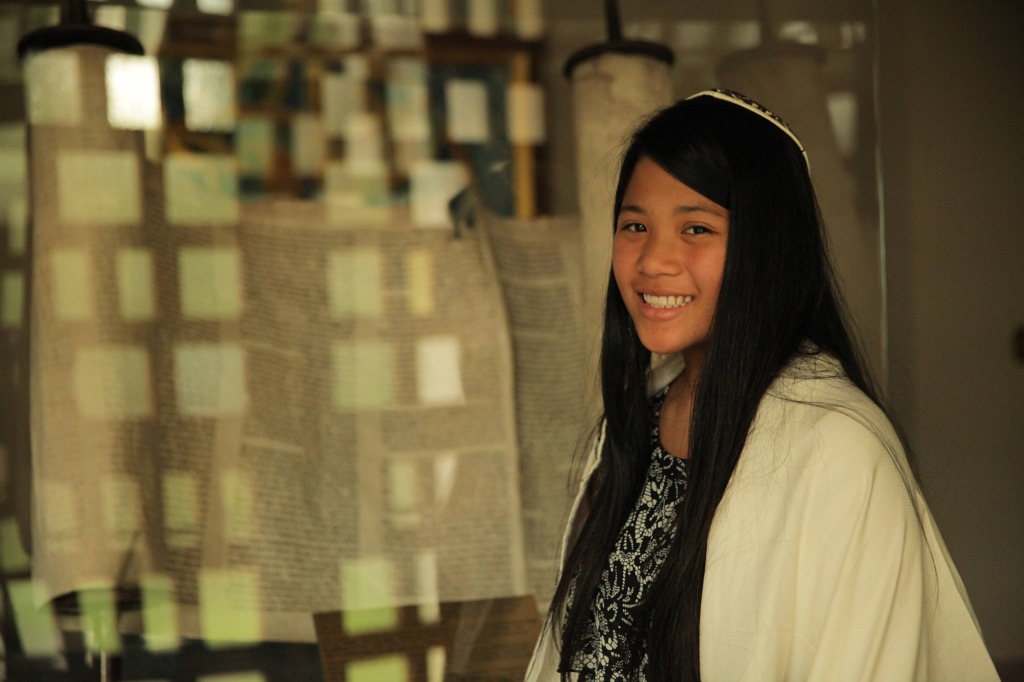 [Image description: Rachael at her Bat Mitzvah and she’s standing in front of the Torah. She is wearing a tallit, a prayer shawl, and a kippah, a religious headwear in Judaism.]
[Image description: Rachael at her Bat Mitzvah and she’s standing in front of the Torah. She is wearing a tallit, a prayer shawl, and a kippah, a religious headwear in Judaism.]Being adopted is amazing. Even though I have a different origin story, I’ve always known that I was adopted so it has never been a big deal for me. For me, it is as normal as me having brown eyes; it has always been there. What’s been harder to deal with is others’ perceptions of me. My insecurities about my identity came from outsiders’ comments and people’s perceptions of me. My mom and I have received many weird and uncomfortable comments, but one that I often remember is, “you know she’s going to be raised by strangers, right?” This was not said in front of me; it was actually told to my mom before she signed the papers to bring me home. As mentioned above, my mom is a single parent, and she has done an extraordinary job making me feel secure and loved growing up. As she worked long hours, I would go to daycare after the school day during elementary until I was old enough to stay at the house by myself for a few hours. To that comment now, I would like to say, “yeah! I was raised by strangers, but those strangers became family to me”. My mom had a vast support system, and I understood that although my family structure was different, she still had the same level of care and love for me as any other family.
The comments don’t end at my mom; they came to me too. I received a few judgemental statements during high school, and a common one was how I was white-washed and not really Asian. I wanted to say in response to these comments, “who cares?!” However, a part of me felt alienated from people because although I felt I was Asian from my looks, I still did not feel Asian enough. I was given this label that I couldn’t do certain things. Since I had a white mom, some people had an attitude of “oh, so that’s how it is.” During high school, I felt stuck on who I was and what I was supposed to be. I couldn’t control what was happening to me, and I couldn’t control the fact that I was adopted; why is there so much judgment towards me?
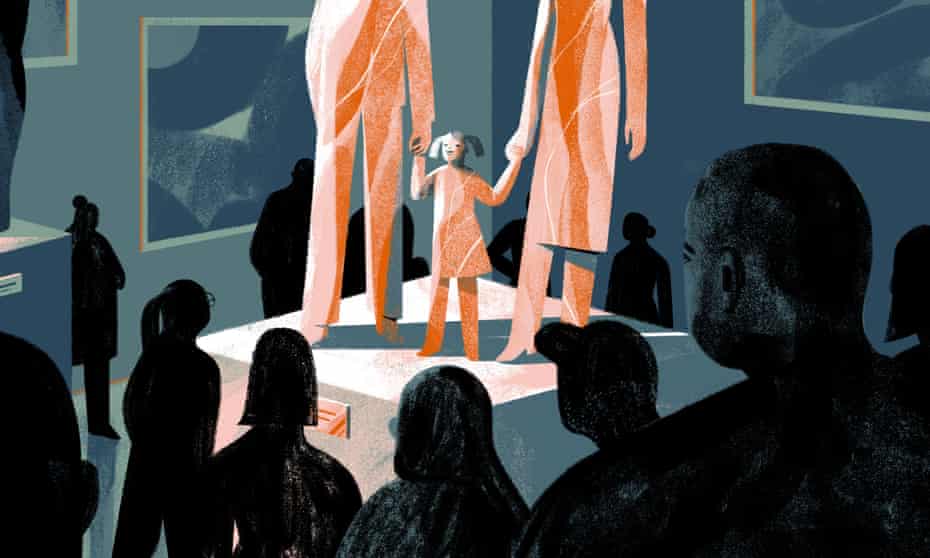 [Image description:The art picture depicts three people standing on a podium in a crowd of people inside what looks to be an art museum. The three people show two parents with their child in the middle who is holding their hands. The picture is from: Stories of transracial adoptees must be heard – even uncomfortable ones.]
[Image description:The art picture depicts three people standing on a podium in a crowd of people inside what looks to be an art museum. The three people show two parents with their child in the middle who is holding their hands. The picture is from: Stories of transracial adoptees must be heard – even uncomfortable ones.]Other transracial adoptees have also experienced this same disconnect between their personal social identities and their adoptive families. The article The Transracial Adoption Paradox reported that about 37% of transracial adoptees felt that race made growing up difficult. This YouTube video called “Do All Adoptees Think the Same?, from the YouTube channel Jubilee, brings in 6 adoptees who all come from different backgrounds, and each brings their own perspectives on the relationship between adoption and identity. One of the adoptees, Alexis, had a more challenging time growing up with her white family as an Asian person. When her adoptive family laughed at her when she said she wanted to be white, it showed a lack of sensitivity, kindness, and understanding. Unfortunately, this has destroyed their relationship now that she’s an adult and is now distant between them. Another adoptee in the video, Rebekah, stated how she was called “oreo” growing up because of her background. Whenever she would try to bring up race or racism against her, she would receive comments like “oh, they didn’t mean it like that” or “they’re just from the older generation, and they don’t understand.”
 [Image description: Rachael holding her cat named Girl Kitty while sitting on a leather couch when she was 11 years old.]
[Image description: Rachael holding her cat named Girl Kitty while sitting on a leather couch when she was 11 years old.]As parents, especially white parents, you need to be prepared to have those conversations about race. When transracial adoptees go to their white parents about how they experience racism, their first response should not be silence or anger because we, as transracial adoptees, are not trying to make it as if it’s our parent’s fault—we want to have this conversation to improve our relationship with parents. We want our parents to learn about racism, prejudice, and white privilege, and work hard to be strong allies. We want our white parents to understand that it is not their fault that we experience racism, but it is their fault if they’re not there to help us. When it comes to addressing and confronting ignorance and racism, being a parent as well as an ally means making it clear that you are always willing to answer our questions, always available to talk about even the most difficult or hurtful experiences, and always there to advocate for us, assist in our healing, or simply share our pain in any way you are able.
Recommended Videos
Others’ experiences of adoption and family history: Adoption & Identity Intertwined
Do All Adoptees Think the Same? | Spectrum
Netflix Show – Colin in Black & White: Colin Kaepernick narrates this drama series recounting his formative years navigating race, class, and culture while aspiring for greatness.
Recommended Readings
The Realities of Raising a Kid of a Different Race
Transracial Adoption in the Time of Black Lives Matter
How to talk to parents about race if you’re adopted or multiracial
Race and Identity in Transracial Adoption: Suggestions for Adoptive Parents
The Transracial Adoption Paradox
Stories of transracial adoptees must be heard – even uncomfortable ones
Avoiding the Savior Complex in Adoption
NPR Podcast – Code Switch: Transracial Adoptees On Their Racial Identity And Sense of Self
Posted: November 29, 2021, 8:30 AM